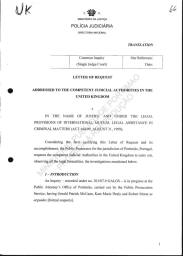The Duty of Letters Rogatory in International Regulation: Key Insights
Letters rogatory serve as a crucial instrument in global legislation, helping with cross-border lawful support by allowing territories to formally ask for evidence and activities from one another. What ramifications might these challenges have for future lawful proceedings?
Interpretation of Letters Rogatory
In the realm of global law, letters rogatory work as formal demands issued by a court in one territory to seek help from a court in another jurisdiction. Letters rogatory. These demands are particularly substantial in cross-border legal procedures, where the enforcement of a court's order or the celebration of evidence might be impeded because of administrative limitations

The procedure normally requires the asking for court to verbalize the specific info or action required from the international court, sticking to the lawful procedures and conventions established in between the territories included. Once released, the letters rogatory are transferred through polite channels, which might include consular offices or embassies, to ensure that the demand is acknowledged and acted on by the foreign court. On the whole, letters rogatory exemplify the participating framework crucial for reliable worldwide lawful processes.
Historic Context
Although the practice of letters rogatory has old origins, its formalization within the framework of global law arised considerably in the 20th century. Historically, such ask for judicial assistance were made use of in various legal practices, including Roman legislation, where they facilitated cross-border teamwork in lawful matters. The idea obtained renewed interest with the surge of globalization and the raising complexity of worldwide lawful communications.
The mid-20th century saw the establishment of treaties and conventions that looked for to systematize the procedure of letters rogatory. Notably, the 1970 Hague Convention on the Taking of Proof Abroad in Civil or Business Matters supplied an organized approach, improving the effectiveness of these demands - Letters rogatory. This duration marked a shift from informal arrangements to a much more organized structure, which addressed the challenges presented by varying nationwide lawful systems
As states came to be more interdependent, the requirement for efficient systems to collect proof throughout boundaries came to be apparent, reinforcing the role of letters rogatory in helping with worldwide teamwork. Today, they stay a critical tool for getting proof and making certain that justice goes beyond nationwide borders, mirroring the advancing nature of global regulation in feedback to international difficulties.
Refine of Issuing Demands
The procedure of releasing letters rogatory typically entails numerous essential actions made to make certain that ask for judicial help are clear, certain, and compliant with both international and residential lawful criteria. An event seeking assistance must prepare an official demand that lays out the significant realities of the situation, the alleviation looked for, and the particular proof or statement needed. This file must be crafted with accuracy to satisfy the lawful demands of the jurisdiction in which it will certainly be submitted.
Adhering to the preparation of the request, it is submitted to the ideal authority, often a court or an assigned governmental company. This authority assesses the request to guarantee it sticks to procedural standards and legal requirements. As soon as approved, the request is transmitted to the international territory with polite channels.
Upon invoice, the foreign court examines the demand's compliance with its neighborhood laws and techniques (Letters rogatory). If accepted, it continues to execute the demand, which might involve the issuance of subpoenas or the collection of proof. Throughout this procedure, maintaining clear interaction between the asking for and obtaining jurisdictions is critical to guarantee effective cooperation and the satisfaction of the demand
Challenges and Limitations
Difficulties and constraints often arise in the process of carrying out read review letters rogatory, usually stemming from differing lawful systems and treatments between jurisdictions. One considerable challenge is the differing criteria of admissibility for proof, which can lead to issues in the approval of documents asked for through letters rogatory. In addition, the lack of uniformity in legal terminology and interpretations can create misunderstandings, complicating communication in between courts in different countries.
Additionally, hold-ups prevail due to bureaucratic processes, as the request may need to go through multiple layers of legal authorities before it is met. In some circumstances, the asked click to investigate for territory might do not have the needed sources or desire to comply, additionally preventing the procedure. Language obstacles likewise add to difficulties, as precise translation of legal documents is crucial for ensuring that the intended message is conveyed without distortion.
Last but not least, sovereignty problems might develop, as some states are hesitant to adhere to requests that they perceive as infringing upon their legal freedom. These obstacles highlight the complexities intrinsic in using letters rogatory, demanding better harmonization and cooperation amongst worldwide lawful systems to enhance their efficiency.

Effect On International Participation
Identifying the relevance of letters rogatory in cultivating international collaboration is critical, as these requests facilitate cross-border legal support and advertise joint efforts in criminal and civil issues. By making it possible for one jurisdiction to formally request support from one more, letters rogatory develop an organized lawful structure that boosts the performance of international interaction in between judicial authorities.
Using letters rogatory aids to develop common trust fund and regard amongst countries, which is crucial in a significantly interconnected globe. They work as a device not just for collecting evidence but also for ensuring that legal procedures informative post are promoted throughout borders. This is especially essential in combating transnational crime, where the lack of ability to safeguard participation can weaken justice.
Furthermore, the reliance on letters rogatory can streamline intricate lawful procedures, reducing hold-ups and unpredictabilities in worldwide investigations. The step-by-step safeguards intrinsic in this process add to the security of individual rights while promoting teamwork among states. Inevitably, the effect of letters rogatory on international participation highlights their role as essential tools in the promo of justice, promoting a collaborative spirit that goes beyond national borders and legal systems.
Final Thought
In conclusion, letters rogatory offer as an important tool in international regulation, promoting cross-border lawful support and cooperation. In spite of inherent difficulties such as differing bureaucratic hold-ups and lawful standards, their standard procedures promote trust fund among countries. The ongoing evolution of these systems is essential for improving the performance of international legal procedures, inevitably fostering more powerful cooperation in both civil and criminal matters throughout territories. The significance of clear interaction in this context can not be overemphasized.
Letters rogatory offer as an essential tool in global law, facilitating cross-border legal assistance by allowing jurisdictions to formally request evidence and activities from one another.The process normally calls for the asking for court to verbalize the specific information or action needed from the foreign court, sticking to the lawful methods and conventions developed in between the jurisdictions included. Historically, such requests for judicial support were utilized in various lawful practices, consisting of Roman legislation, where they assisted in cross-border teamwork in legal issues.The process of issuing letters rogatory generally involves numerous essential actions created to make sure that requests for judicial assistance are clear, details, and certified with both international and residential legal standards.In addition, hold-ups are typical due to bureaucratic procedures, as the request may require to pass with multiple layers of lawful authorities before it is met.